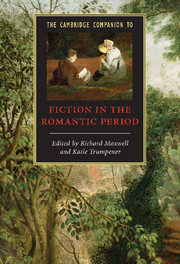Book contents
- Frontmatter
- Introduction
- 1 The historiography of fiction in the Romantic period
- 2 Publishing, authorship, and reading
- 3 Gothic fiction
- 4 The historical novel
- 5 Thinking locally: novelistic worlds in provincial fiction
- 6 Poetry and the novel
- 7 Orientalism and empire
- 8 Intellectual history and political theory
- 9 Women writers and the woman’s novel: the trope of maternal transmission
- 10 Tales for child readers
- 11 Sentimental fiction
- 12 Fiction and the working classes
- 13 The Irish novel 1800-1829
- 14 Scotland and the novel
- Further reading
- Index
- Series List
5 - Thinking locally: novelistic worlds in provincial fiction
Published online by Cambridge University Press: 28 January 2009
- Frontmatter
- Introduction
- 1 The historiography of fiction in the Romantic period
- 2 Publishing, authorship, and reading
- 3 Gothic fiction
- 4 The historical novel
- 5 Thinking locally: novelistic worlds in provincial fiction
- 6 Poetry and the novel
- 7 Orientalism and empire
- 8 Intellectual history and political theory
- 9 Women writers and the woman’s novel: the trope of maternal transmission
- 10 Tales for child readers
- 11 Sentimental fiction
- 12 Fiction and the working classes
- 13 The Irish novel 1800-1829
- 14 Scotland and the novel
- Further reading
- Index
- Series List
Summary
Of all situations for a constant residence, that which appears to me most delightful is a little village far in the country; a small neighbourhood, not of fine mansions finely peopled, but of cottages and cottage-like houses. . . . Even in books I like a confined locality. . . . Nothing is so tiresome as to be whirled half over Europe at the chariot wheels of a hero, to go to sleep at Vienna, and awaken at Madrid; it produces a real fatigue, a weariness of spirit. On the other hand, nothing is so delightful as to sit down in a country village in one of Miss Austen's delicious novels, quite sure before we leave it to become intimate with every spot and every person it contains; or to ramble with Mr White over his own parish of Selborne, and form a friendship with the fields and coppices, as well as with the birds, mice, and squirrels, who inhabit them.
(Mary Russell Mitford, Our Village)In the first chapter of Our Village, her collection of rural sketches (published as a collection 1824-34), Mary Russell Mitford stages her taste for a confined rural locality through three points of divergence from eighteenth-century aesthetic tastes. First, she shifts attention from the finer classes and their country estates to the village and its inhabitants. Second, she esteems residence over travel. And third, she prefers a detailed, specific, and intimate knowledge of a single place to a broad cosmopolitan knowledge of many places, achieved by propertied aristocratic gentlemen through extensive travel, education, and leisure. Mitford gently mocks this cosmopolitan knowledge gained from a whirl “half over Europe” and subscribes instead to a competing model of knowledge espoused by Gilbert White in The Natural History and Antiquities of Selborne (1789): “Men that undertake only one district are much more likely to advance natural knowledge than those that grasp at more than they can possibly be acquainted with: every kingdom, every province, should have its own monographer.”
- Type
- Chapter
- Information
- The Cambridge Companion to Fiction in the Romantic Period , pp. 89 - 106Publisher: Cambridge University PressPrint publication year: 2008
- 3
- Cited by

